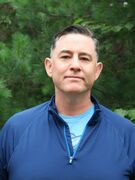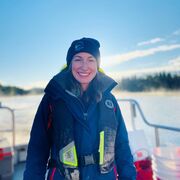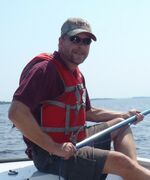Join Dr. Scott Higgins, Dr. Clare Nelligan, and Dr. Leif Olmanson at 1:00 PM CDT on September 11 for an exploration of the ways in which climate change is already affecting the Rainy - Lake of the Woods basin. Read their bios below.
Around the world, this past summer has been one for the record books. While July was cooler than normal in our area, globally, the month broke temperature records. Searing heat waves have parched Europe, the US, and China. Catastrophic floods hit eastern North America throughout the summer, while much of the west continues to toil under crippling drought. Canada’s worst recorded fire season saw wildfire activity in every province and territory, burning communities and producing smoke plumes that have choked cities across the US, Canada and even into Europe.
While the science of climate attribution – that is, being able to pinpoint causation in the relationship between specific extreme weather events and global climate change – is constantly improving, we already know that some of these effects are absolutely made more severe by climate change. According to World Weather Attribution, a U.K.-based research partnership among Imperial College London, the Royal Netherlands Meteorological Institute, and the Red Cross Red Crescent Climate Centre, “Without human induced climate change these heat events would however have been extremely rare,” and without climate change, in all regions heat waves would have been cooler by several degrees.
It's relatively easy to comprehend some of the impacts of climate change on our day-to-day lives when the skies are clouded with smoke from distant fires, or we see dramatic year-to-year fluctuations in rainfall, snow pack, and water levels in our communities. But what does local science actually tell us about how our regional climate is changing? Is the Rainy – Lake of the Woods watershed more or less severely impacted than other parts of the globe? What are some of the specific local and regional concerns and what is being affected here?
These are the questions we’ll be addressing in our next Ask an Expert webinar on September 11, 2023 at 1:00 PM CDT. We’ll be joined by three scientists who study climate change in our basin in a variety of ways. As always, come prepared to ask thoughtful questions and engage in discussion.
About the Presenters

 Dr. Clare Nelligan is a graduate of the PEARL (Paleoecological Environmental Assessment and Research Lab) at Queen’s University. Her doctoral research with Dr. John Smol focused on using lake sediments to assess long-term environmental trends in Ontario lakes that support Lake Trout. Following her graduate studies, Clare joined the Great Lakes Unit at the Ontario Ministry of the Environment, Conservation, and Parks and completed a postdoctoral fellowships focusing on agricultural nutrient loads in the Laurentian Great Lakes basin. Clare now works as an Aquatic Scientist at Minnow Aquatic Environmental Services. In this webinar, Dr. Nelligan will talk to us about what lake sediments can tell us about climate change and especially its impacts on cold water fish species.
Dr. Clare Nelligan is a graduate of the PEARL (Paleoecological Environmental Assessment and Research Lab) at Queen’s University. Her doctoral research with Dr. John Smol focused on using lake sediments to assess long-term environmental trends in Ontario lakes that support Lake Trout. Following her graduate studies, Clare joined the Great Lakes Unit at the Ontario Ministry of the Environment, Conservation, and Parks and completed a postdoctoral fellowships focusing on agricultural nutrient loads in the Laurentian Great Lakes basin. Clare now works as an Aquatic Scientist at Minnow Aquatic Environmental Services. In this webinar, Dr. Nelligan will talk to us about what lake sediments can tell us about climate change and especially its impacts on cold water fish species.
Dr. Leif Olmanson is a Researcher at the University of Minnesota with over 20 years experience developing remote sensing applications to create temporally and spatially rigorous datasets of water and land resources for large-area ecosystem characterization. He is particularly interested in developing field-validated image processing methods implemented in automated geospatial analysis systems such as Google’s Earth Engine and Minnesota Supercomputing Institutes supercomputers to gain a better understanding of the natural environment. He led a team of researchers and computer scientists to build a near real-time water quality monitoring system for Minnesota’s >10,000 lakes using satellite imagery to provide critical water quality information for lake management and recreation. He is currently expanding the water quality monitoring system to other areas. In this webinar, Dr. Olmanson will demonstrate satellite imagery documentation of changes to the climate - and water quality - of Minnesota lakes, including the Rainy - Lake of the Woods watershed.
Note that the session will be recorded for rebroadcast to the LOWWSF website.

